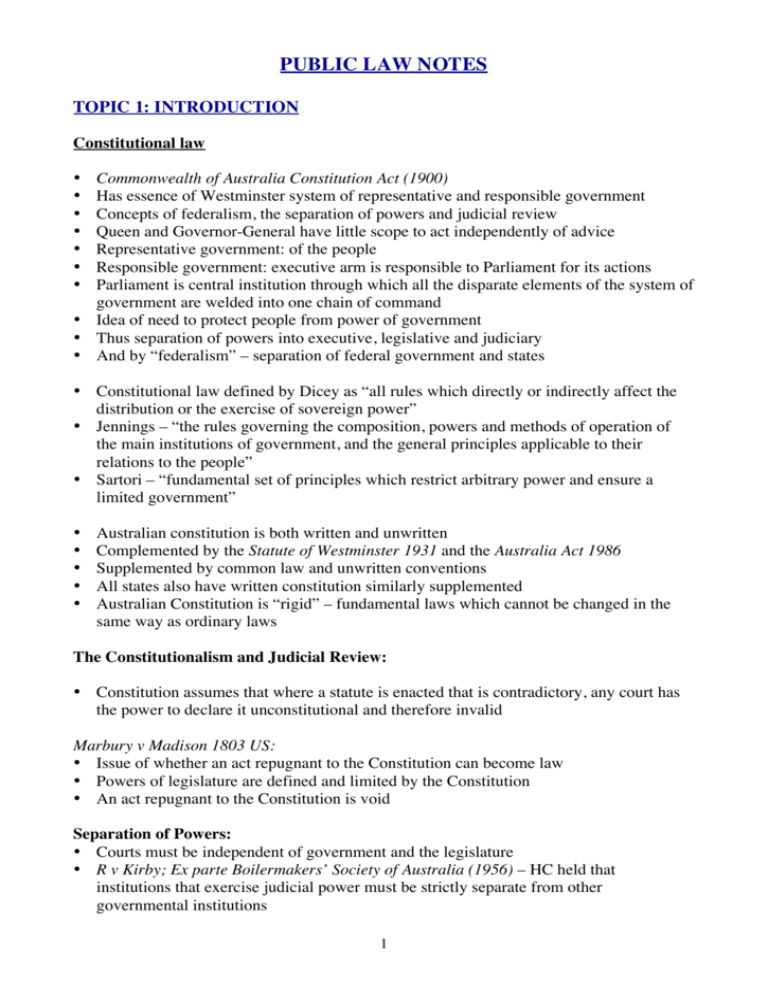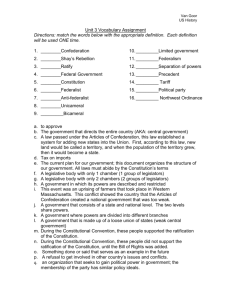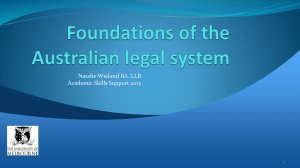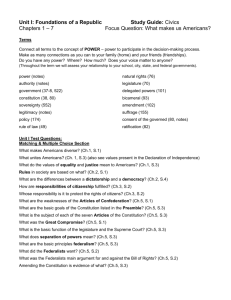public law notes - Amazon Web Services
advertisement

PUBLIC LAW NOTES TOPIC 1: INTRODUCTION Constitutional law Commonwealth of Australia Constitution Act (1900) Has essence of Westminster system of representative and responsible government Concepts of federalism, the separation of powers and judicial review Queen and Governor-General have little scope to act independently of advice Representative government: of the people Responsible government: executive arm is responsible to Parliament for its actions Parliament is central institution through which all the disparate elements of the system of government are welded into one chain of command • Idea of need to protect people from power of government • Thus separation of powers into executive, legislative and judiciary • And by “federalism” – separation of federal government and states • • • • • • • • Constitutional law defined by Dicey as “all rules which directly or indirectly affect the distribution or the exercise of sovereign power” • Jennings – “the rules governing the composition, powers and methods of operation of the main institutions of government, and the general principles applicable to their relations to the people” • Sartori – “fundamental set of principles which restrict arbitrary power and ensure a limited government” • • • • • Australian constitution is both written and unwritten Complemented by the Statute of Westminster 1931 and the Australia Act 1986 Supplemented by common law and unwritten conventions All states also have written constitution similarly supplemented Australian Constitution is “rigid” – fundamental laws which cannot be changed in the same way as ordinary laws The Constitutionalism and Judicial Review: • Constitution assumes that where a statute is enacted that is contradictory, any court has the power to declare it unconstitutional and therefore invalid Marbury v Madison 1803 US: • Issue of whether an act repugnant to the Constitution can become law • Powers of legislature are defined and limited by the Constitution • An act repugnant to the Constitution is void Separation of Powers: • Courts must be independent of government and the legislature • R v Kirby; Ex parte Boilermakers’ Society of Australia (1956) – HC held that institutions that exercise judicial power must be strictly separate from other governmental institutions ! 1! The Westminster Constitution • Dicey: fundamental principles are representative democracy, parliamentary sovereignty and the rule of law • Parliamentary sovereignty: any act must be obeyed by the courts • Argued there is no body/person who can make rules which override an Act • Judicial legislation is subordinate legislation, carried on with the assent and subject to the supervision of Parliament • The function of the courts is to determine whether legislation is within the limits of the powers of government • But the actual exercise of Parliament’s authority is controlled by two limitations, internal and external • External: possibility that subjects will disobey or resist laws • Internal: legislature is the product of certain social condition and determined by whatever determines the society The rule of law: Jennings: • Rule of law requires that powers of the Crown and servants should be derived from and limited by either legislation enacted by Parliament, or judicial decisions taken by independent courts International Commission of Jurists: • Rule of Law implies that all power in the state should be derived from and exercised in accordance with the law • Assumes the law itself is based on respect for the supreme value of human personality • May be characterised as the principles which the experience and traditions of lawyers globally have shown to be important to protect the individual from arbitrary government and enable the dignity of men Stephen: • Government should be under the law • Those who play their part in administering the law should be independent of government • Should be ready access to the courts for those who seek remedy and relief • Law should be certain, general and equal in operation • The rule of law as an implicit, but undefined, part of Australia’s constitutional system has been acknowledged judicially Statutory interpretation: • There exists a presumption that statutes are not intended to alter the common law, and that they are not intended to impair civil liberties or fundamental human rights Potter v Minahan 1908 HC: • An Australian-born person returning from overseas could not be regarded as immigrant • Legislature did not intend to deprive any Australian-born person the right after absence to re-enter Australia unless it has so enacted by express terms or necessary implication ! 2! Waterside Workers’ Federation of Australia v Gilchrist, Watt & Sanderson Ltd (1924) HC: • The full literal intention will not ordinarily be ascribed to general words where that would conflict with the recognised principles that Parliament would be prima facie expected to respect • Must be something unequivocal either in context or circumstances, to rebut presumption Coco v The Queen 1994 HC: • Courts should not impute to legislation an intention to interfere with fundamental rights • Must be unmistakable and unambiguous language • The presumption may be displaced by an implication is it is necessary to prevent statutory provisions from becoming inoperative or meaningless Re Bolton; Ex parte Beane 1987 HC: • Unless the parliament makes unmistakably clear its intention to suspend a fundamental freedom, the courts will not construe a statute as having that operation R v Home Secretary; Ex parte Sims 2000 UK: • Courts presume that even the most general words were intended to be subject to the basic rights of the individual R v Home Secretary; Ex parte Pierson 1998 AC: • Parliament legislates for a European liberal democracy founded on the principles and traditions of the common law • Displaced by a clear and specific presumption to the contrary • Unless there is a clear provision to the contrary, parliament must be presumed not to legislate contrary to the rule of law Dicey: • Parliamentary sovereignty has favoured the rule of law, and that the supremacy of the law of the land both calls forth the exertion of parliamentary sovereignty and leads to it being exercised in a spirit of legality • Parliament has power to make all laws, no one else can override or set aside the legislation of parliament • But legislative arm of government is subject to the constitution • Therefore not entirely unaccountable and supreme • So rather than parliamentary sovereignty, but parliamentary supremacy • But Dicey argues that the role of the people in the law making process is limited – stops at the point of electing representatives, and then it is out of our hands Allan: • Rule of law acts to restrict parliamentary sovereignty to its purpose of facilitating democracy • Legislation is the outcome of a democratic process whose legitimacy is ultimately dependent on its respecting minimum standards of justice • Traditional role of the courts in defence of individual rights ! 3! Constitutional conventions: Dicey: • Constitutional law consists of two elements • Law of the constitution – body of undoubted law • Conventions of constitution – maxims or practices which are not in strictness laws at all • Conventions underpin operation of Australian Constitution • E.g. office of the Prime Minister Colonial Laws Validity Act: • Doctrine of repugnancy: British parliament could enact laws for the colonies • Colonies bound by British law, applied to them by paramount force • But also had power to amend or appeal English law received • Acknowledged Britain could enact laws, but also colonial powers could change laws Federation • Failure to include Bill of Rights consistent with Dicey’s notion of Parliamentary sovereignty • Question of whether the doctrine of repugnancy affected the commonwealth • Accepted that Colonial laws Validity Act continued to apply with notion of repugnancy • Commonwealth also limited by doctrine of extraterritoriality • Colonies could not make laws about something external to the colony • Applied to commonwealth as well as states after federation The Statute of Westminster: • Removed any restrictions upon commonwealth legislative power arising under the extraterritoriality doctrine • Under s4 the British Parliament could still legislate for Australia, but only with the “request and consent” of the Australian parliament • Commonwealth parliament could not enact laws inconsistent with British legislation • Excluded operation of Colonial Laws Validity Act and the doctrine of repugnancy • This is whether Australia gained some independence • S2 provides Colonial Laws Validity Act does not apply to dominions, British parliament could only legislate with request and consent of Commonwealth parliament • Commonwealth could not enact laws inconsistent with British law • Only restriction: could not alter/repeal/change Australian Constitution • Statute of Westminster does not apply to the states • States still bound by repugnancy and extraterritoriality Extraterritoriality: • The idea that the colonies could not legislate extraterritorially has always been controversial • Doctrine overturned in Croft v Dunphy • But Australian courts were reluctant to adopt this • Pearce v Florenca – clear statement from HC that Cth and States can make laws with extraterritorial operation • Reaffirmed in Union Steamship Co v The King ! 4! Pearce v Florenca 1976 HC: • WA act sought to legislate extraterritorially • HC held that the law was valid • Settled law that extraterritorial law is valid if it is connected, not too remotely, with the state which enacted it, or if it operates on some circumstance which appertains to state • Held valid if there is any real connection – even a remote or general connection – between the subject matter of the legislation and the state • Can be liberally applied Bistricic v Rokov 1976 HC: • Court held that British statutes continued to apply in the states through paramount force China Ocean Shipping Co v South Australia 1979 HC: • Continued application of Imperial laws, but subject now to the power of repeal of amendment by Commonwealth legislation Kirmani v Captain Cook Cruises Pty Ltd (No 1) 1985 HC: • Court held that part VIII of Merchant Shipping Act had successfully been repealed • Brennan J: a matter excluded from the Commonwealth’s power to repeal/amend British legislation must satisfy two qualifications: it must be a matter within state legislative power, and it must not be a matter within Commonwealth legislative power • Brennan held that the act was not a matter within the authority of the states • Murphy J: source of power to repeal the act was in constitution itself, as external affair • The commonwealth parliament possesses legislative competence to preclude or exclude from Australia the direct operation of the laws, executive actions and judicial decisions of any other country including the UK Appeals to the Privy Council: • 1968: power to limit appeals from the HC was exercised in the Privy Council (Limitation of Appeals) Act 1968 • Held valid in Kitano v Commonwealth 1976 • 1975: Privy Council (Appeals from the High Court) Act 1975 – leave only granted for proceedings commenced before Act • Held valid in Attorney-General v T & G Mutual Life Society Ltd 1978 • Viro v R 1978: court held no longer bound by any Privy Council decision • HC now treats PC decisions as if they are its own, vis: persuasive but not binding • Australia Act 1986: confirmed the HC’s position as the highest court The Australia Act: • Signalled end of power of British parliament to legislate for Australia • Final step in severing of legal ties • Similar scheme to Statute of Westminster • Marked final legal separation between Aus and UK • Clearly removed repugnancy and extraterritoriality Sue v Hill 1999 HC: • Hill tried to stand for QLD senate but disqualified because had not renounced UK citizenship ! 5! • • • • Hill claimed that as long as UK retained some residual influence then not foreign power UK held to be foreign power since Australia act No institutions of UK government exercise any judicial powers in Australia Considered validity of Australia Act – was valid pursuant to Australian constitution Attorney-General (WA) v Marquet 2003 HC: • The continuance of the constitution of a state pursuant to s106 is subject to any commonwealth law enacted pursuant to the grant of legislative power in s51 • Kirby: considered said s 6 of Aus Act potentially invalid because sought to put constraint on parliament • But all other judges held Australia Act is certainly valid The Constitution as binding: Lindell: • Covering Clause 5 makes it clear that the Constitution was intended to “be binding on the courts, judges and people of every state and of every part of the commonwealth” • Constitution was legally binding because of status accorded to British statutes as an original source of law in Australia and also because of supremacy of such statutes • Now accords status as higher law because of the will and authority of the people Structure of the constitution: • Chapter 1 – the parliament ! House of Reps – Part III ! Senate – Part II – envisaged as states house (protecting the interests of the states) ! S 51 – concurrent powers – powers shared by the commonwealth and the states ! S 52 – powers exclusive to the commonwealth • Commonwealth parliament can only make laws about what it is allowed in section 51 – what is not mentioned is left to the states • Concurrent powers in s 51 – shared by both commonwealth and the states • These are not exclusive powers • Only very few exclusive federal powers, which largely concern the operation of the parliament • S 9 – inconsistency between state and commonwealth laws, commonwealth prevails • Left to the states are residual powers • States can make laws about anything, whereas commonwealth can only make laws about heads of power as set out in the constitution Chapter 2 – the Executive: S 61 – vests executive power in the Governor General (head of the executive) No mention of the PM and Cabinet Chapter 3 – The Judiciary Chapter IV – Finance and Trade Chapter V – States ! S 107 – residual powers ! S 109 – deals with inconsistency between commonwealth and state laws • Ch VIII – Amendments to the constitution ! S 128 – majority of electors and a majority of states ! Therefore rigid constitution • • • • • • ! 6! Separation of powers: • Three arms of government • Executive – administrators of law ! Prime Minister and Cabinet make these decisions, despite the fact that officially this power is invested in the GG according to the constitution • Legislative – makes law • Judicial – enforces/applies law • Separation of powers vital for accountability and to prevent dictatorial government • But in Australia there isn’t a strict separation because members of executive must be members of the legislature too • Makes members of the executive accountable to the public; Westminster idea of responsible government • Can only work if ministers are responsible in Parliament for their decisions • But strict separation of judicial power – important implications Breaches of notion of strict separation: • But the appointment of judges is by the Executive (AG) and is not particularly transparent • Also the judiciary engages in law making, rather than simply applying the law • But also delegated legislation Notion of responsible government: • The Westminster system inherited from the UK • A principle of convention more than constitutional role • Ministerial responsibility • Ministers must come from parliament because this provides a chain of accountability Australian Federalism • Division of powers between commonwealth government and the states • Regulating the distribution of powers between the commonwealth and the states because in Australia constitutional power is shared between the 2 levels of government Federal structure: • S107 – saving of power of state parliaments • NSW Constitution Act 1902 NSW s 5 – the legislature shall, subject to provisions of the constitution, have power to make laws for peace, welfare and good government of NSW Distribution of powers: • S 51 provides “heads of powers” which the commonwealth can make laws about • States can also make laws about these – concurrent powers • S 52 – only the commonwealth can make laws – exclusive powers • Everything else left to the states – residual powers • Commonwealth/state relations are imbalance • Commonwealth govt increasingly made laws concerning areas not set out – e.g. environment • States have power to make laws for the peace, welfare and good government of the state ! 7! • HC interprets and enforces the constitution – understanding the impact of this on commonwealth/state relations • Commonwealth has better bargaining position to negotiate on issues because have the money • Many matters not even within contemplation of drafters of constitution • Commonwealth government in much stronger position to legislate over states Constitutional Commission: • Features are a high degree of autonomy for the governmental institutions of the commonwealth and the states, a division of power between these organisations, and a judicial “umpire” Galligan and Walsh: • Federalism both increases popular participation in politics and allows public goods to be more finely tailored to popular preferences • Thus enhances democracy Gillespire: • One of the oldest arguments for a federal system is based on the belief that division of powers between levels of government is a guarantee that state will not become too large or oppressive • Federalism can limit government power to infringe rights, since it creates the possibility that a legislature wishing to restrict liberties will lack constitutional power • Idea of “due process” limits arbitrary action by the state • Division of authority guarantees due process • More remedies and political resources to draw upon Abbott 2009: • Proposes change to allow federal government to resolve problems the state cant handle • Proposes constitutional amendment to allow commonwealth government to make laws generally and propose laws in all areas • State governments that delivered services efficiently would be at little risk of interference • Should put one level of government in overall charge States have been service providers Less accountability because not two levels Harder to regulate/respond to needs of population On a practical level, might be very difficult for commonwealth government to have to control all these new areas • Massive geographical space, state and territory governments play an important role in dispersing all these services over such wide areas • Would require changing the constitution, deeply unlikely to happen especially re something so huge as abolishing the states/removing all their practical power • • • • ! 8! TOPIC 2: CONSTITUTIONAL AMENDMENT AND RIGHT PROTECTION Constitutional Amendment Each state parliament has the power to amend their constitution Subject to such binding “manner and form” requirements as parliament itself imposes Historical power granted by s 5 of the Colonial Laws Validity Act 1865 Purpose to establish that colonies have power to amend their own constitutions Each colonial parliament was to have a continuing power to re-enact and re-write its own Constitution Act • Flexible, not rigid, constitutions • • • • • Taylor v AG Queensland 1917 HC: • Issue whether QLD parliament possessed the power to enact the Parliamentary Bills Referendum Act allowing the creation of an alternative legislative procedure by-passing the Legislative Council • Court held Act valid by relying in s 5 CLVA • Issues: • 1. Validity of the act • 2. Whether the act could be used to abolish the upper house • Isaacs: the full meaning of the words must be given to them, thus a self-governing community should be able to say one house is sufficient as its legislature • Intended that a colonial legislature should have the power to constitute new courts as well as to mould their form, duties, but powers do not extend to power to produce anarchy by enacting that there should be no legislature • Powers are limited to determining the nature of the legislative body, its powers of legislation and methods of procedure • True effect of the act was to limit the power of the Legislative Council by rendering its concurrence unnecessary in the making of laws in certain circumstances • To abolish the Legislative Council would be a law relating to the constitution, powers and proceedings as it would leave the Legislature still a representative legislature within the meaning of the CLVA Parliamentary Bills Referendum Act • 1915/1916 bill to amend QLD constitution by abolishing Legislative Council • Supreme Court granted injunction to prevent referendum • Referendum went ahead (awkwardly failed, but that’s not the point) • Issue of constitutional law: did QLD parliament have power to effectively create alternative legislative procedure by bypassing Legislative Council? • Held did have power by relying on s 5 Colonial Laws Validity Act McCawley v The King 1920 AC: • QLD created arbitration court, president automatically member of Supreme Court • President’s term for 7 years, yet legislation said membership of Supreme Court was for life – members of the bar complained that s 6(6) was unconstitutional if capable of appointing someone to the Supreme Court for only 7 years • Privy Council affirmed power Of QLD to pass s6(6), effectively amending state’s constitution ! 9! • Power to amend could be exercised impliedly, even in the absence of an express intention • Case reaffirms the full power of a legislature to amend its own constitution • Doctrine of implied repeal: law later in time will automatically change a law enacted previously if inconsistent with it • No manner and form restriction in constitution different to ordinary course of making laws Manner and Form Requirements • Restrict legislative powers of the Parliament by requiring that laws on certain topics may only be enacted by a special and more difficult procedure • By introducing suitable worded “manner and form” requirements, a State Parliament can effectively limit the power of future Parliaments • Origins in s 5 of the CLVA • Similar proviso in s 6 of the Australia Act 1986 – limited to manner and form requirements imposed by a law of the same parliament • Infringing laws are denied effectiveness, but seem to be able to still exist, just redundantly Amendment of the state constitution: • S 106 – ensured that the constitution act of each colony would continue as at the establishment of the constitution • S 5 Colonial Laws Validity Act • Subject to manner and form requirements • Taylor v AG • McCawley v The King • Today’s parliament can restrict ability of future parliaments to change provisions if relate to constitution, powers and proceedings • Exception to doctrine of parliamentary sovereignty that cant fetter later parliaments ability to change certain types of laws • Laws must be about constitution, powers and proceedings of parliament, and thus can restrict ability of future parliaments to change by placing a manner and form restriction Decisive judicial test – Attorney General v Trethowan 1931 HC: • NSW state government attempted enacted new s 7A into the NSW Constitution Act to prevent any attempts to abolish the upper house • Meant that Legislative Council could not be abolished without a referendum, and also by virtue of sub-section (6), 7A could not be amended or repealed without referendum • Legislative Council tried to pass a bill trying to repeal s 7A without a referendum • Supreme Court held s 6 could not be repealed by ordinary act, only in manner proscribed • S 7A incorporated a “manner and form” requirement imposed by a law within the meaning of s5 of the CLVA • Appeal to HC • Legislative Council could not be abolishing without a referendum unless s 7A amended or repealed, but that also required a referendum • Determination of construction • Did s6 require a manner and form in which a law repealing s7A must be passed? – yes ! 10!







